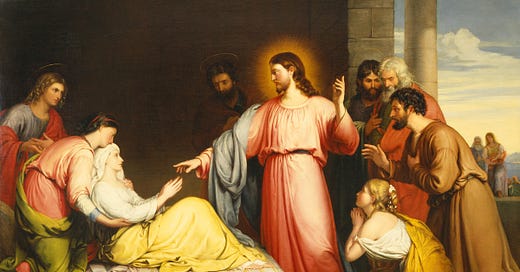Jesus performed many miracles, but they weren’t just for the benefit of those who were healed. Otherwise, why even bother to write them down? He has greater goals in mind: to spread the Good News, and to inspire others to imitate him.
Reading I
Heb 2:14-18
Since the children share in blood and Flesh, Jesus likewise shared in them, that through death he might destroy the one who has the power of death, that is, the Devil, and free those who through fear of death had been subject to slavery all their life. Surely he did not help angels
but rather the descendants of Abraham; therefore, he had to become like his brothers and sisters in every way, that he might be a merciful and faithful high priest before God to expiate the sins of the people. Because he himself was tested through what he suffered, he is able to help those who are being tested.
Jesus didn’t become a man for the sake of angels. They didn’t need saving; we do. Jesus had to go through everything we do, not only suffering himself, but seeing his friends and loved ones suffer, too.
He has an empathy that, say, the Greek and Roman gods of myth never had. In Mark’s Gospel today, Jesus’s friend’s wife’s mother isn’t well.
But it doesn’t matter how distantly related she is to him. Jesus feels compassion and helps her. What’s her reaction? Read on…
Responsorial Psalm
105:1-2, 3-4, 6-7, 8-9
R. The Lord remembers his covenant for ever.
Give thanks to the LORD, invoke his name;
make known among the nations his deeds.
Sing to him, sing his praise,
proclaim all his wondrous deeds.
R. The Lord remembers his covenant for ever.
Glory in his holy name;
rejoice, O hearts that seek the LORD!
Look to the LORD in his strength;
seek to serve him constantly.
R. The Lord remembers his covenant for ever.
You descendants of Abraham, his servants,
sons of Jacob, his chosen ones!
He, the LORD, is our God;
throughout the earth his judgments prevail.
R. The Lord remembers his covenant for ever.
He remembers forever his covenant
which he made binding for a thousand generations--
Which he entered into with Abraham
and by his oath to Isaac.
R. The Lord remembers his covenant for ever.
Psalm 105 is one of the longer psalms, because it recounts the history of Israel. We praise him for fulfilling his promise to our ancestors.
It may seem random, but it actually fits neatly between our first reading and Gospel reading today. The writer of the Letter to the Hebrews says Jesus didn’t come for the angels, but for us. Here, although God made a promise to the Israelites, they are supposed to tell every nation about His greatness. So again, God is for everyone, not just a few.
And, of course, while they are the chosen people and beneficiaries of the covenant, they are also servants. Coming up in the Gospel, we’ll see how being blessed by God leads to the expectation that you’ll also serve.
Alleluia
Jn 10:27
R. Alleluia, alleluia.
My sheep hear my voice, says the Lord.
I know them, and they follow me.
R. Alleluia, alleluia.
I don’t have much to say about this one. Jesus frequently uses this metaphor to explain how he’s taking care of us.
But coincidentally, today I found this on an Edgy Atheist Memes Facebook group, and thought it was hilarious:
Ironically, there’s a lesson here. In Matthew’s version of the parable,1 the shepherd separates the sheep from the goats. And in the Final Judgement, that's true.
But here in this life, the goats choose to separate themselves (or ourselves, if we’re not careful). And that’s what this memer is doing, whether he2 knows it or not. He's denying his relationship with God. We need to be careful to reaffirm that relationship whenever we can.
Gospel
Mk 1:29-39
On leaving the synagogue Jesus entered the house of Simon and Andrew with James and John. Simon’s mother-in-law lay sick with a fever. They immediately told him about her. He approached, grasped her hand, and helped her up. Then the fever left her and she waited on them.
When it was evening, after sunset, they brought to him all who were ill or possessed by demons. The whole town was gathered at the door. He cured many who were sick with various diseases, and he drove out many demons, not permitting them to speak because they knew him.
Rising very early before dawn, he left and went off to a deserted place, where he prayed. Simon and those who were with him pursued him and on finding him said, “Everyone is looking for you.”
He told them, “Let us go on to the nearby villages that I may preach there also. For this purpose have I come.” So he went into their synagogues, preaching and driving out demons throughout the whole of Galilee.
Nowadays, a fever isn’t that big of a deal. Take some Tylenol, get some sleep, and you’ll most likely be fine in the morning. But this wasn’t just any old fever. In the original Greek, after healing her, Jesus doesn’t just “help” her up; he raises her up. It’s the same word Mark puts in the angel’s mouth when he tells them women that Jesus was raised from the dead.3
This was a woman on the brink of death. And what does she do after this miracle?
She gets to work. She does her duty (traditionally, the woman of the house set the table for the Sabbath), and serves others.
We often pray for Jesus’ intercession, as the apostles did, but do we think about what we’ll do when we see the miracle? We can’t wait on Jesus directly, as Simon’s mother-in-law did. But we can serve him by serving others around us. Referring again to the sheep and goats, the shepherd separates them because “whatever you did for one of these least brothers of mine, you did for me.”
Jesus spends the rest of the night healing the sick and casting out demons, which is probably tiring work. But He didn’t sleep in the next morning; he got up the next morning to pray. That prayer, that conversation with God, is as important as the miracles on Earth.
But His work is never done. More people come to him for miracles, and Jesus decides to take the show on the road. He wants to spread the Good News, which the miracles are simply a sign of.
Not to be sexist, but you just know this edgelord is a he.






